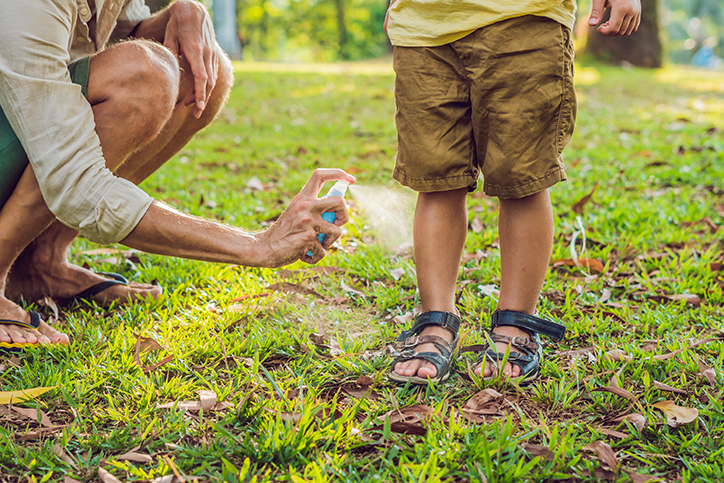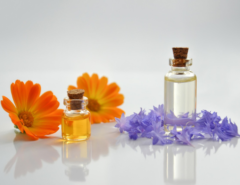Summer is in full force! Whether you’re going camping in the woods or just playing at the neighborhood park, you’ll likely find yourself applying sunscreen and bug spray before heading out. When used correctly, insect repellents don’t pose a threat to humans. But if you use too much or apply it in the wrong way, you can run into some unwanted effects. Let’s explore how to safely use insect repellents to better protect our loved ones when outdoors.
DEET Insect Repellents
DEET is one of the most common ingredients in insect repellents. It is sprayed onto and then absorbed through the skin. In high concentrations, DEET can cause harmful side effects such as nausea, vomiting, and seizures. The American Academy of Pediatrics (AAP) and Centers for Disease Control and Prevention (CDC) recommend children older than 2 months use an insect repellent that contains 10 – 30% DEET. Never use DEET on children younger than 2 months.
The AAP states that products with DEET concentrations of 10% appear to be as effective as those with concentrations of 30% when used according to the directions on the product label. The concentration of DEET in an insect repellent is not directly related to its effectiveness, but to its duration of effect. The AAP recommends choosing an insect repellent with the lowest effective concentration for the amount of time that you will spend outside. Products with concentrations of 10% DEET are effective for two hours, while those with concentrations of 30% are effective for five hours. DEET should only be applied once a day.
Products that combine DEET with a sunscreen should not be used. Sunscreen must be reapplied during the day, but DEET should not be reapplied since it will not wash away in water. Reapplying a combination product can be dangerous. Combination products can also lessen the effectiveness of the sunscreen’s sun protection factor (SPF). Always read the entire label before using any insect repellent.
DEET Alternatives
The Environmental Protection Agency offers a free online tool to help families find an insect repellent that works best for their needs. Make sure the product you choose is meant to be applied on the skin.
Picaridin provides long lasting protection from insect bites. It is odorless and has a lighter feel on the skin. There are no age restrictions for using products that contain picaridin. Picaridin is also less likely to cause unwanted side effects than DEET. Products containing oil of lemon eucalyptus and IR3535 are also available. These products are as safe to use as picaridin.
Permethrin-containing products are only used for clothing and gear, such as boots, pants, socks, and tents. These products should never be applied to the skin.
Insect Repellent Safe Use
Always read and follow the directions printed on the label of insect repellents. The following safety tips are also helpful to keep in mind when using these products:
Do |
Do Not |
| Read the label before use | Use more than directed |
| Apply to the skin (except Permethrin-containing products) | Apply to skin that has cuts, wounds, or is irritated |
| Apply repellent on all children older than two months | Let children apply alone or apply on their hands or around their mouth or eyes |
| Apply repellent to the face by first spraying onto the hands, then rub onto face | Apply spray directly to the face |
| Apply to all skin not covered by clothing | Apply to skin under clothing |
| Apply when outside | Apply in an enclosed area or near food |
| Wash your hands after applying repellent | Touch your eyes or mouth after applying repellent |
| Remove and wash clothing, and wash the skin after spraying and being outdoors | Leave spray on clothing and skin after being outdoors |
Additional Resources
- AAP- Choosing an Insect Repellent for your Child
- CDC- Preventing Mosquito Bites
- EPA- Using Insect Repellents Safely and Effectively
- National Pesticide Information Center- Insect Repellents Fact Sheet
Contact the Maryland Poison Center right away if you or someone you know has ingested an insect repellent or gets the product in their eyes. Experts are available 24/7 to provide free, confidential help at 1-800-222-1222.





Leave a Reply